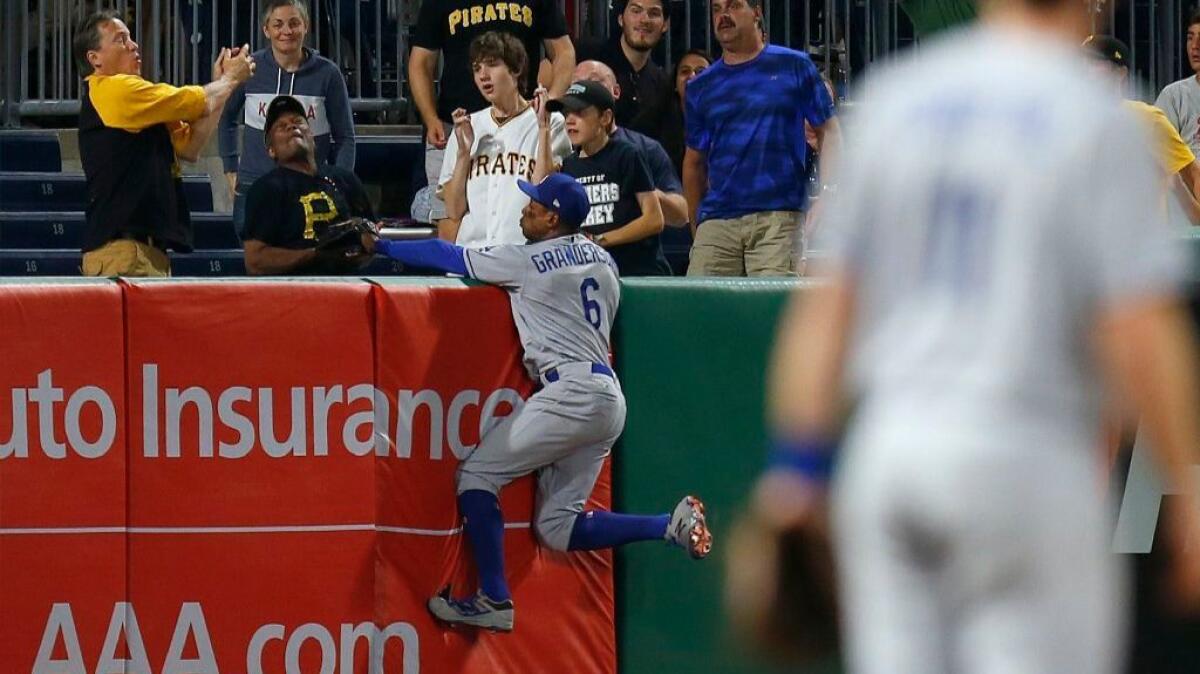A nearly perfect game by Rich Hill is spoiled by a Dodgers television blackout

With a no-hitter still possible, Hill went out in the 10th — and promptly gave up a homer to Josh Harrison, giving the Pirates a 1-0 victory. (Aug. 24, 2017)
- Share via
Like many folks who follow the Dodgers, I was driving around town late Wednesday afternoon when Rick Monday waved me home.
Rich Hill was throwing a perfect game in Pittsburgh against the Pirates. Monday and Kevin Kennedy were splendidly calling it on radio, setting it up for me to rush to the living room and watch the ending on television.
I sped to my street, crawled through a pack of utility trucks lining the block, then sprinted into the house just in time to flick on Spectrum SportsNet LA and watch Hill freeze Sean Rodriguez on a full-count fastball and strike him out looking to end the eighth inning.
It was dramatic. It was Hill stalking off the mound toward history. It was Joe Davis’ voice roaring with excitement from the booth.
Then it all went black. The TV went dark. The TV stayed dark. I started to scream.
And for the rest of the game, like many folks who follow the Dodgers, I couldn’t watch them on television.
I missed Logan Forsythe’s ninth-inning error that ended the perfect game. How did it look? Was it a close call? Could he have made the play?
I missed watching Dave Roberts standing in the dugout pondering whether to send Hill back out for the 10th. Was there a discussion? Was Hill part of it?
And, of course, I missed Josh Harrison’s 10th-inning homer that broke up the no-hitter and gave the Pirates a 1-0 victory. It was the first time a pitcher had lost a no-hitter with a walk-off home run, and the moment completely eluded me. More history, more darkness.
Actually, I didn’t completely miss the homer, because I used my smartphone’s hotspot on my laptop to access a computerized gamecast recreation. In it, Harrison’s hit was a tiny ball making a looping green laser over a drawing of left field. Big whoop.
I spent part of the final two innings receiving play by play on speakerphone from one of my editors, Mike Hiserman. I was also texting colleague Helene Elliott, who passed along observations from her working TV.
I know now I should have searched for access to a radio, I could have even run back outside and jumped back into the car, but it all happened so fast, and I kept thinking the TV would come back on. It was draining. It was awful. Trying to watch a perfect Hill was pure hell.
And right about now, more than half of Los Angeles households are saying welcome to our world.
For four years, I’ve been loudly critical about the senselessness of the Dodgers TV blackout that has affected a majority of L.A. homes. I’ve remained critical even though, since Charter bought Time Warner Cable, I’ve been able to see the games in my home.
But now that I’ve been personally reminded what it’s like to be in the dark, especially during what may be the greatest summer in major league history, my latest criticism will take the form of a question.
How do you people do it? How do you follow a team you cannot see? Why do you follow a team you cannot fully enjoy?

I’ve been blacked out of only two innings this summer and I nearly lost my mind. I cannot imagine the disconnect felt by Dodgers fans missing nearly all of it.
For those two innings, I felt like there was a wall between myself and the team’s greatness. I felt like I was on the outside trying to peer at history through a window of tinted glass. I felt left out. And I wondered, how long will fans endure that feeling before they just turn their backs and walk away? Even in a summer where every game represents a different thrill, are there fans who are already leaving because they’re just tired of the hassle?
I was reminded Wednesday night that, while one can certainly follow the Dodgers without television, it takes work, it requires imagination, and it’s not all that fun.
It was obviously not the Dodgers fault my TV suddenly didn’t work. Maybe it was all those utility trucks outside. But it’s clearly the Dodgers who control their brand, and that brand is being slowly damaged even as this team grows ever stronger. Even if the blackout is not strictly the fault of Dodgers ownership, it’s their name on the TV contract, their name on their shirts and their responsibility to figure this out.
Hill showed great strength Wednesday in hanging in there for nine hitless innings.
“Just continue to keep working, keep getting it done and keep moving forward,” he told reporters afterward.
Roberts showed guts in leaving Hill out there for the 10th, sending yet another clear message to his team about playing bold.
“It was something really special to watch,” he told reporters.
The Dodgers lost the game, but they won more hearts with their steadfast belief that they can and will achieve greatness.
If only Dodgers ownership would show this same fortitude sometime before the end of this season. Your team has become a beautiful thing. Let your city watch them.
Get more of Bill Plaschke’s work and follow him on Twitter @BillPlaschke
MORE SPORTS NEWS
Chargers eye preseason meeting with Rams as they get ready for games that count
Side by side: What’s going down when Mayweather and McGregor enter the ring
USC quickly rebuilding depth on offensive line with freshmen
More to Read
Go beyond the scoreboard
Get the latest on L.A.'s teams in the daily Sports Report newsletter.
You may occasionally receive promotional content from the Los Angeles Times.











